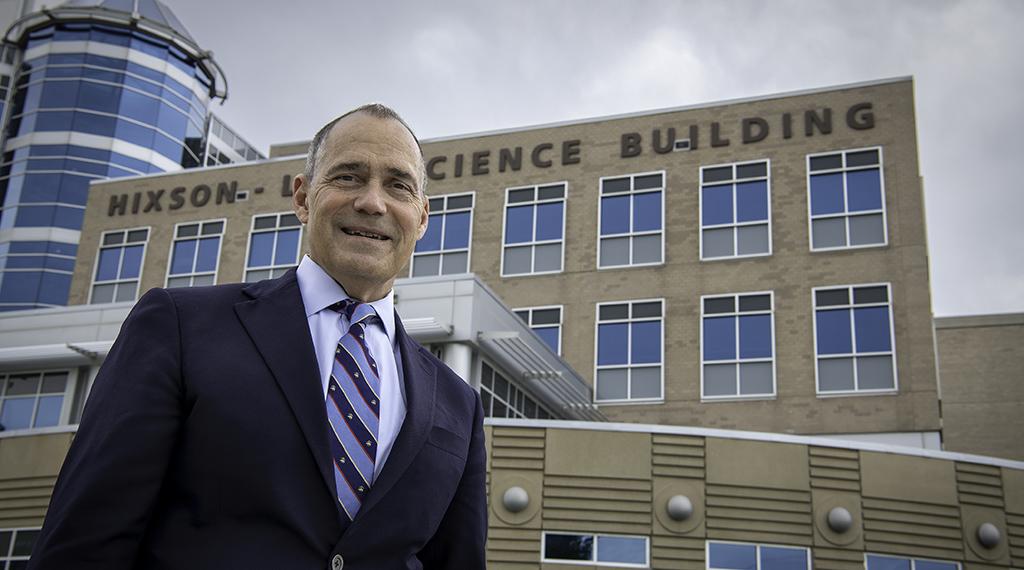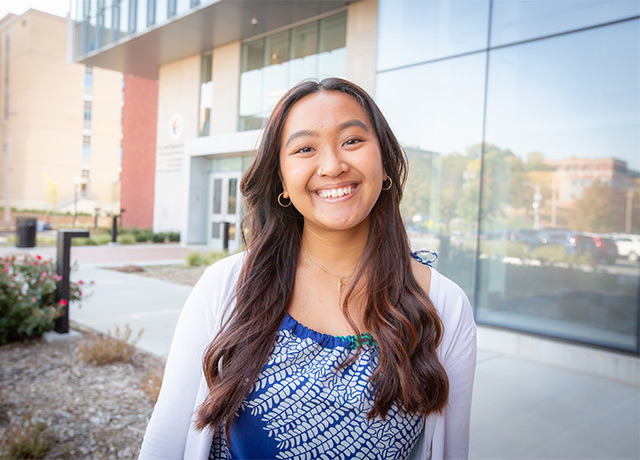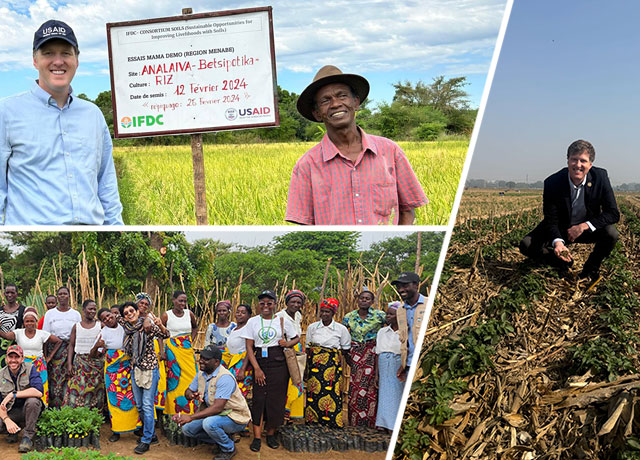Featured Testimonial About Creighton University

Being a doctor is a human endeavor; it’s a relationship. There is so much of humanity that we can’t define by formulas. In order to be the best physician possible, you need to truly understand a patient’s goals, desires, fears and spiritual perspective.

In his life, his career, his worldview, Iowa oncologist Richard L. Deming, MD’80, embodies the rich role the humanities play in the physician-patient relationship.
Deming doesn’t just treat his patients’ cancer. He meets them (and their families) at their most vulnerable point. Together, they confront the enormity of it all:
Life. Death. What it means to be human.
And what better way to get at the human than the humanities.
Psychology, philosophy, religion, literature, the arts — for Deming, they’ve all served as opportunities for true connection; they’ve all helped him get to the areas of healing that go beyond the physiological.
To help ensure more physicians know the healing power of the humanities, Deming, medical director of the Mercy Cancer Center in Des Moines, has made a significant gift to the newly formed department of medical humanities in the University’s School of Medicine. The Richard L. Deming, MD, Endowed Chair in Medical Humanities will support faculty as they prepare students to become well-rounded and compassionate physicians, fostering change and changing lives in the world around them.
We spoke to Deming about the importance of the medical humanities, how he connects with his patients and why accepting one’s death can lead to a more rewarding life.
* * *
You’ve spoken about how in your work you’re not treating the cancer, you’re treating the person. How would you describe your role as a physician?
Deming: When I started out, I thought I was embarking on a purely scientific endeavor and scientific career, one that would allow me to use all my math and science toward a vocation. But, having chosen oncology, clearly the spiritual dimension of what it means to be a human and to be mortal is ever-present in every interaction with patients. And I’ve now come to realize that what started out as a career in medicine has really become a ministry of healing. Healing is much more than the science of medicine.
For me, oncology is the opportunity for the left brain and the right brain to work together. As a cancer physician, I need to utilize my science and math abilities, but to be truly successful in caring for patient, I need to recognize that this is a human endeavor that requires my emotional intelligence, as well. Being present as a human being with another human being and being knowledgeable about philosophy, psychology, religion and spirituality allows me to help guide and walk with individuals on their cancer journey.
That’s a good segue to the medical humanities. Why are they important to you as a physician? Why are they important for physicians in general?
Deming: As I’ve had the opportunity to interact with thousands of cancer patients, I’ve learned the therapeutic value of just being present with them. Genuine caring and authentic compassion have tremendous healing power. And much of that power comes from knowing the value of the humanities. What I gained through my classes on spirituality, theology, philosophy, psychology and literature has had a huge impact on my success as a physician.
Being a doctor is a human endeavor; it’s a relationship. There is so much of humanity that we can’t define by formulas. In order to be the best physician possible, you need to truly understand a patient’s goals, desires, fears and spiritual perspective. The humanities — arts, literature, psychology, theology, spirituality and philosophy — they provide the window to connect with patients and provide the opportunity for healing.
What’s something you’ve learned as a physician?
Deming: I used to compartmentalize my life. Here was my work, and here was my life outside of work. Over time, I have come to integrate my life. At some point, I came to understand that the values that are important to me transcend the demarcation of work/personal life. As I reflected on issues of meaning, purpose and joy as they relate to my life, I began to open up with patients. I started to ask them to reflect on what values are important to them and how they think of meaning and purpose. What brings them joy? Eventually, I became comfortable sharing aspects of my life philosophy with my patients. That represented a beginning in my understanding of authentic doctor/patient relationships. You can’t have a true authentic relationship with your patients if you don’t share a part of yourself.
Along the way, it became obvious to me that the doctor/patient relationship had tremendous therapeutic power. I began to share a little more with patients, some of my nuggets of philosophy, of how certain aspects of living have brought more joy into my life. Through these conversations, my patients became willing to explore what brings joy into their lives.
Last year, you were in a serious bicycle accident. For decades, you’ve worked in a field that deals with mortality on a daily basis. How have these experiences shaped your views on death? How have they shaped your views on life?
Deming: You cannot endure, let alone succeed, in field of oncology if you don’t have an understanding and acceptance of death. Understanding that you will die someday is essential to understanding humanity. But for many people, understanding that they will die someday is horrifying.
As a physician and a human being, I’ve come to understand death as part of the process of living. Knowing I’m going to die someday does not detract from the joy that I’m experiencing today. If diamonds were as plentiful as grains of sand, they would be worthless. If we lived forever, wasting a day of our life would be trivial. It’s because we don’t live forever that makes today so valuable. There are too many people who think they want to live forever but don’t have a clue about what they will do this afternoon to bring joy into their life or make a difference in the world.
I’m sure no two responses from patients are alike. But as you’ve guided so many patients and their families through this process, what have you learned about people? How do you get them to discuss what is surely, for most, a terrifying topic?
Deming: Plato wrote something to the effect that “death is the bedrock of all spirituality.” I practice in Iowa, and most of my patients are Christians. The Christian doctrine emphasizes a belief in an afterlife, which presumably will be better than this worldly life. This theological doctrine doesn’t provide a lot of comfort to many of my patients. There are many Christians who are still very wary of death, even if they profess to believe in a heavenly afterlife.
Helping individuals open up to the discussion of mortality is important, especially in the field of oncology. When a patient hears the words, “You have cancer,” it’s like being hit over the head with a two-by-four. It reminds them of two things that they already know but try desperately to forget every day: Number 1, you’re going to die someday. And number 2, you don’t know when that’s going to be.
That’s what makes the cancer journey so ripe for learning. Even if your cancer has a very favorable prognosis, cancer makes you acutely aware of the reality of your mortality. It’s an opening to personal reflection. How have I been living my life?
How do I want to live my life? How can I live an autobiography that I’d like to read someday. Understanding that you will die someday is not an invitation to sulk and mourn. It’s a trumpet blast to wake you up to the possibilities that today presents.
10 ideas from Dr. Deming — from a talk he presented at a Des Moines event for community leaders
1. None of us is as good as all of us
There’s not a single thing that any one of us has done totally by oneself that is worth a hill of beans. Things of significance are accomplished through teamwork and collaboration. Embrace, celebrate and elevate your team. Express gratitude to those who have helped you on your journey.
2. Adversity leads to personal growth
You don’t learn much about yourself when everything is going well. It’s when things are difficult that you find the strength that is already deep within yourself. Finding and cultivating your strength leads to resilience. Cherish the difficult moments in your life as your best teachers.
3. Courage is grace under pressure
Courage is not the absence of fear. Fear is actually a good thing. Fear is our body’s way of saying to us, “Wake up! Pay attention! There is something here that may cause you harm.” Recognizing our fear is the first step to coming up with a plan to move forward even when danger may be present. Fear can be a source of creativity, ingenuity and resourcefulness. Courage is the act of strategizing, mitigating danger and calmly moving forward, all the while knowing that there are potential consequences to our actions.
4. Suffering leads to compassion
In Latin, the word for suffering is “passion,” as in the passion of Christ. The word “compassion,” in Latin, means “to suffer with.” Epiphany! So, it’s our own suffering that allows us to recognize suffering in ourselves and in others. More than that, it’s our own suffering that encourages us to respond to the suffering of others and to reach out compassionately to help relieve the suffering of others. The recognition of suffering in others is part of empathy – the ability to understand and share the feelings of others. Compassion, on the other hand, is taking an action to help relieve the suffering we encounter.
5. Take time for reflection
What is the meaning of my life? Philosophers have written extensively on our search for it. Clearly, there is not a single answer. But contemplating the meaning of one’s own life is a worthwhile endeavor. In fact, the search for the meaning of life may actually be the meaning of life. I have met so many people who think that they want to live forever but who don’t have a clue what they’re going to do TODAY to find joy for themselves or to make the world better. Taking time to reflect on life’s big questions is essential to understanding your place in the world.
6. The wisdom of not knowing
Embrace the fact that there is much that we do not know. For centuries, the smartest people in the world were certain that the world was flat, and that turned out to be false. In the practice of medicine, we go through periods where we’re certain that things are true, and they turn out not to be. So rather than approaching things as if I absolutely know the right answer, I approach my work and my life knowing that our understanding of the world will change over time. We acquire knowledge, but over time we learn that some of that knowledge is proven to be untrue. Wisdom, however, is a result of our life experiences. Unlike knowledge, wisdom is eternal.
7. The path to joy runs right through the middle of suffering
We do not come to know joy in spite of suffering. We come to know it because of suffering. There are two fundamental visions of happiness. One perspective is the hedonic vision, which focuses on attainment of pleasure and avoidance of pain. This is the path that encourages one to sit on the beach with a beer and avoid getting stung by a bee. The second vision of happiness is what Aristotle refers to as “eudaimonia.” This perspective focuses on finding meaning and self-realization as the source of happiness. This is the path that encourages one to seek a mountain to climb.
8. Memento mori: Remember that you will die someday
Live today with passion. If diamonds were as plentiful as grains of sand, they would be worthless. If we lived forever, wasting a day of our life would be trivial, but it’s because we don’t live forever that makes today so valuable.
9. Not everyone can be cured, but everyone can be healed
As a cancer physician, I’ve learned so much from my patients and their families. Cancer reminds us that we are mortal. It reminds us what we already know – that we are going to die someday, even if it isn’t because of cancer. It also reminds us what we sometimes forget – that we are alive today and that life is a blessing to be lived each and every day. It’s ironic, but cancer, a sometimes-fatal disease, can actually teach us how to live our lives. It has the power to wake us up to reality and inspire us to pursue lives of purpose, passion and compassion.
10. Beauty is everywhere
I often encourage my patients to try to do three things each and every day. First, open your eyes to the beauty of the world today. Seek out beauty. If you look for it, you will find it all around. Second, do something nice for someone today. And third, let someone do something nice for you. That’s the way of the world. The interconnectedness of all of us. Spirituality is recognizing the interconnectedness of everything. Everything in the universe is also undergoing constant change – including ourselves. We are all interconnected, and everything is impermanent. Beauty is inherent in the workings of the universe. The less we focus on tomorrow and the more we focus on today, the greater our ability to see beauty right before us, right now.


